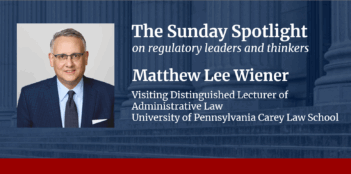
Scholar recommends improvements to agencies’ management of congressional requests on behalf of constituents.
Every American, at some point in time, interacts with the sprawling federal bureaucracy. When people get lost in the bureaucratic maze or cannot access the information or attention they need, they often ask their members of Congress to intervene. Members often receive over a thousand constituent requests per year on everything from social security benefits and passport issues to complex regulatory issues.
This constituent casework can serve as a tool for congressional oversight of the administrative state by raising Congress’s awareness of potential problems with agency operations and the delivery of services. The Administrative Conference of the United States (ACUS) asked me to address the various ways that agencies respond to congressional casework and suggest best practices to improve their responses. My resulting report informed ACUS Recommendation 2024-4, which advises agencies to adopt best practices such as better standard operating procedures (SOPs), performance metrics, and technology to improve casework.
As a former legal counsel for a Massachusetts state senator, I was occasionally asked to assist with constituent casework. This experience gave me some insight into and appreciation for the role congressional staff play as a conduit between constituents and an agency.
To begin my inquiry, I surveyed several congressional offices’ constituent service staff about agency responsiveness and what potentially causes challenges or difficulties for agencies. I then interviewed casework staff at several agencies to understand their processes, methods of communication with Congress, staffing levels, and metrics for success.
Although Congress dedicates a significant percentage of its staff to casework, and agencies expect to be contacted by staff about constituent issues, there are important limitations on what members can and should do for their constituents. Ethics rules for the House of Representatives and Senate allow members to request information about a constituent’s case before an agency, urge prompt agency consideration of the case, and express judgment about it. Still, congressional intervention does not, and should not, push a case “to the front of the line” or ensure a positive outcome. This fact often leads congressional staff to see their primary job as managing constituents’ expectations.
In my research, I found that agencies vary greatly in their congressional casework processes, often due to the size of the agency, the volume of constituent inquiries, and whether the agency relied on regional offices or centralized casework at headquarters. Although some of these variations will persist, the report and ACUS recommendation did identify best procedural practices that will improve the casework process. They included:
- Agencies should create SOPs to assist in training agency and congressional staff, to assist congressional staff in communicating with and managing the expectations of constituents, and to keep congressional staff up-to-date with changes to agency processes and response timing. Agencies should make the SOPs publicly available, along with a plain-language summary, on their websites. The report and resulting recommendation outlines standard procedures that could be the basis for agencies to develop or amend their SOPs.
- Agencies should establish performance goals for processing casework and, for each goal, create objective and data-driven measures to determine if the goal was met.
- Senior agency officials regularly should consider whether issues raised by casework indicate policy issues or procedural hurdles facing the public that the agency should address.
- Agencies should build relationships with congressional staff both through individual offices during periodic meetings and trainings, and by working with the House Office of the Chief Administrative Officer and the Senate’s Office of Education and Training.
- Agencies should not prematurely close out case files but instead notify congressional staff that the file is incomplete and work with them to remedy the deficiency.
- Agencies should leverage technology, such as case management systems and web-based portals, to manage, track, and resolve casework but not use technology as a substitute for outreach to Congress and constituents.
One of the most interesting issues during ACUS’s debate on these best practices concerned whether Congress should be involved in casework at all. Early drafts of my report were criticized for treating congressional intervention as a noble and needed exercise for both constituents and oversight.
Many of these criticisms came from my friend and colleague Boston University law professor Jack Beermann, a scholar of administrative law and an ACUS senior fellow. Beermann wrote that the “primary function of casework is to win loyal voters, sort of pork barrel writ small.” He also argued that Congress, which establishes and funds agencies, has an interest in making the system difficult so that constituents need their services.
These may be valid concerns. If agencies and their processes were properly conceived and implemented, there would be no need for congressional intervention. In theory, all Americans who have business with federal agencies should get great service and receive what they deserve under the law. If there is a problem, they should be able to speak to an agency ombudsman.
Sadly, this is not, and never will be, the case; the federal government is just too complex. Obviously, elected officials are political creatures and seek out ways to win votes. Still, from my experience and discussions with congressional staff, they would greatly prefer to focus on fewer casework files and not deal with the same issues repeatedly. If casework causes a change in the law or agency behavior to reduce constituent complaints, that is an unqualified positive—including for members of Congress and their staff.
Casework is important to members of Congress and their constituents, and agencies can make changes to their procedures and processes to make casework more efficient and effective. Hopefully, my study and ACUS’s resulting recommendation will help agencies receive, process, and respond to congressional casework requests in an accurate, efficient, transparent, and timely manner.
This essay is part of a series, titled “Seeking Continuous Improvement to the Administrative Process.”




